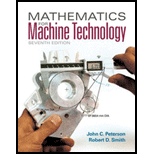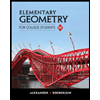
Mathematics for Machine Technology
7th Edition
ISBN: 9781133281450
Author: John C. Peterson, Robert D. Smith
Publisher: Cengage Learning
expand_more
expand_more
format_list_bulleted
Question
Chapter 47, Problem 12AR
To determine
(a)
To solve problem for following given values.
To determine
(b)
To solve problem for following given values.
To determine
(c)
To solve problem for following given values.
To determine
(d)
To solve problem for following given values.
To determine
(e)
To solve problem for following given values.
To determine
(f)
To solve problem for following given values.
Expert Solution & Answer
Want to see the full answer?
Check out a sample textbook solution
Students have asked these similar questions
Obtain the voltage across the capacitor for the following input: (a) 5Volts; (b) 3sin(t); (c) 2 cos(t). please show that you use Partial Fraction Decomposition, Laplace transform and Cramer's rule.
Obtain the voltage across the capacitor for the following input: (a) 5Volts; (b) 3sin(t); (c) 2 cos(t). please show that you use Laplace transform and Cramer's rule.
5.12 A steel wire 300 feet long and 1½-½ inch in diameter
weighs 0.042 #/ft. If the wire is suspended vertically from
its upper end, calculate (a) the maximum tensile stress due
to its own weight and (b) the maximum weight W that can
be safely supported assuming a safety factor of three and
an ultimate tensile stress of 65 ksi.
a. The maximum tensile stress due to
its own weight
b. Maximum weight
Knowledge Booster
Learn more about
Need a deep-dive on the concept behind this application? Look no further. Learn more about this topic, advanced-math and related others by exploring similar questions and additional content below.Similar questions
- 5.6 The turnbuckles in the diagram shown are tightened until the compression block DB exerts a force of 10,000# on the beam at B. Member DB is a hollow shaft with an inner diameter of 1.0 inch and outer diameter of 2 inches. Rods AD and CD each have cross-sectional areas of 1.0 in.². Pin C has a diameter of 0.75 inch. Determine: a. The axial stress in BD- b. The axial stress in CD- c. The shearing stress in pin C. B UB CD PIN VIEWED FROM BELOWarrow_forward5.15 The ends of the laminated-wood roof arch shown are tied together with a horizontal steel rod 90 feet, "10 inches" long, which must withstand a total load of 60 k. Two turn- buckles are used. All threaded rod ends are upset. a. Determine the required diameter D of the rod if the maximum allowable stress is 20 ksi. b. If the unstressed length of the rod is 90 feet, "10 inches" and there are four threads per inch on the upset ends, how many turns of one turnbuckle will bring it back to its unstressed length after it has elongated under full allowable tensile stress? E = 29 × 103 ksi. a. Required diameter D b. Number of turns LAMINATED WOOD ROOF ARCH TIE ROD TURNBUCKLE DETAIL: UPSET ENDarrow_forward5.8 A reinforced concrete column is 12 feet long, and un- der load, it shortens 3 inches". Determine its average unit strain. Average Unit Strainarrow_forward
- 5.10 A 500-foot-long steel cable is loaded in tension and registers an average unit strain of 0.005. Determine the total elongation due to this load. Total Elongationarrow_forward5.14 A 100-foot-long surveyor's steel tape with a cross- sectional area of 0.006 square inch must be stretched with a pull of 16# when in use. If the modulus of elasticity of this steel is E = 30,000 ksi, (a) what is the total elongation 8 in the 100 foot tape and (b) what unit tensile stress is pro- duced by the pull? a. Elongation b. Tensile Stressarrow_forwardObtain the voltage across the capacitor for the following input: (a) 5Volts; (b) 3sin(t); (c) 2 cos(t). Use Laplace transform and Cramer's rule.arrow_forward
- Obtain the voltage across the capacitor for the following input: (a) 5Volts; (b) 3sin(t); (c) 2 cos(t). Use Laplace transform and Cramer's rule.arrow_forwardObtain the voltage across the capacitor for the following input: (a) 5Volts; (b) 3sin(t); (c) 2 cos(t). Use Laplace transform and Cramer's rule.arrow_forwardv(t) + R₁ = 1 ohm W R2 = 1 ohm www i1(t) 0000 L = 2H i2(t) C 1F + vc(t)arrow_forward
- Obtain the voltage across the capacitor for the following input: (a) 5Volts; (b) 3sin(t); (c) 2 cos(t). Use Laplace transform and Cramer's rule.arrow_forwardFor communcation marks. In the questions answered above should have the criteria show proper mathematical form use proper symbols, notations, conventions, graph(s) where applicable solution is neat, clear and easy to follow If you write on the paper in online version you will be assigned 0 marks except graph.arrow_forwarda) If is a polynomial function, does always have to have a horizontal asymptote? If no, provide a counterexample. ax+b b) Write an equation for a rational function whose graph of the formex+d where f(x) has all the indicated features. X-intercept of 14 Y-intercept of -1/2 VA with equation -2/3 HA with equation 4/3arrow_forward
arrow_back_ios
SEE MORE QUESTIONS
arrow_forward_ios
Recommended textbooks for you
 Mathematics For Machine TechnologyAdvanced MathISBN:9781337798310Author:Peterson, John.Publisher:Cengage Learning,
Mathematics For Machine TechnologyAdvanced MathISBN:9781337798310Author:Peterson, John.Publisher:Cengage Learning, Algebra: Structure And Method, Book 1AlgebraISBN:9780395977224Author:Richard G. Brown, Mary P. Dolciani, Robert H. Sorgenfrey, William L. ColePublisher:McDougal Littell
Algebra: Structure And Method, Book 1AlgebraISBN:9780395977224Author:Richard G. Brown, Mary P. Dolciani, Robert H. Sorgenfrey, William L. ColePublisher:McDougal Littell Elementary Geometry for College StudentsGeometryISBN:9781285195698Author:Daniel C. Alexander, Geralyn M. KoeberleinPublisher:Cengage Learning
Elementary Geometry for College StudentsGeometryISBN:9781285195698Author:Daniel C. Alexander, Geralyn M. KoeberleinPublisher:Cengage Learning Elementary Geometry For College Students, 7eGeometryISBN:9781337614085Author:Alexander, Daniel C.; Koeberlein, Geralyn M.Publisher:Cengage,
Elementary Geometry For College Students, 7eGeometryISBN:9781337614085Author:Alexander, Daniel C.; Koeberlein, Geralyn M.Publisher:Cengage, Glencoe Algebra 1, Student Edition, 9780079039897...AlgebraISBN:9780079039897Author:CarterPublisher:McGraw Hill
Glencoe Algebra 1, Student Edition, 9780079039897...AlgebraISBN:9780079039897Author:CarterPublisher:McGraw Hill

Mathematics For Machine Technology
Advanced Math
ISBN:9781337798310
Author:Peterson, John.
Publisher:Cengage Learning,

Algebra: Structure And Method, Book 1
Algebra
ISBN:9780395977224
Author:Richard G. Brown, Mary P. Dolciani, Robert H. Sorgenfrey, William L. Cole
Publisher:McDougal Littell

Elementary Geometry for College Students
Geometry
ISBN:9781285195698
Author:Daniel C. Alexander, Geralyn M. Koeberlein
Publisher:Cengage Learning

Elementary Geometry For College Students, 7e
Geometry
ISBN:9781337614085
Author:Alexander, Daniel C.; Koeberlein, Geralyn M.
Publisher:Cengage,

Glencoe Algebra 1, Student Edition, 9780079039897...
Algebra
ISBN:9780079039897
Author:Carter
Publisher:McGraw Hill
Understanding Fractions, Improper Fractions, and Mixed Numbers; Author: Professor Dave Explains;https://www.youtube.com/watch?v=qyW2mWvvtZ8;License: Standard YouTube License, CC-BY